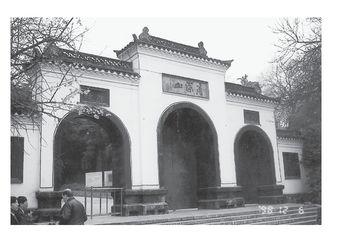Zen's Chinese Heritage: The Masters and Their Teachings (108 page)
Read Zen's Chinese Heritage: The Masters and Their Teachings Online
Authors: Andy Ferguson
Tags: #Religion, #Buddhism, #Zen, #Biography & Autobiography, #Religious, #Philosophy

Zhimen said, “It’s just a piece of copper.”
The monk then asked, “What about after it is polished?”
Zhimen said, “Then you can take it.”

A monk asked, “What is perceived by the pupil of the diamond-eye?”
Zhimen said, “A handful of sand.”
The monk then asked, “Why is it like that?”
Zhimen said, “It’s not a noble realm.”

Zen master Zhimen entered the hall and addressed the monks, saying, “All of you put your staffs over your shoulder and go traveling, leaving one monastery and traveling to the next. How many different types of monasteries do you say there are? It’s either a sandalwood monastery surrounded by sandalwood, or it’s a thistle monastery surrounded by thistles. Or it could be a thistle monastery surrounded by sandalwood, or a sandalwood monastery surrounded by thistles. Of these four types of monasteries, in which type is each of you willing to spend your life? If you don’t find a place to pass your life securely then you’re just wearing out your sandals for no reason, and eventually the day will come when the King of Hell will take away all of your sandal money!”

LIANHUA FENGXIAN, “HERMIT OF LOTUS FLOWER PEAK”
LIANHUA FENGXIAN (n.d.) was a disciple of Fengxian Daoshen in the Yunmen Zen school. He lived on Lotus Flower Peak in the vicinity of Mt. Tiantai in Zhejiang Province.

A monk asked Lianhua Fengxian, “What is the call of the mud ox of the snowy peaks?”
Lianhua said, “Listen.”
The monk said, “What is the cry of Yunmen’s wooden horse?”
Lianhua said, “Sound.”

When Lianhua was about to die, he held up his staff and asked the assembly, “When the ancients reached
this
, why didn’t they agree to remain here?”
The monks didn’t answer.
Lianhua said, “Because by this path no power is attained.”
Then, Lianhua said, “After all, what is it?”
He then placed the staff on his shoulder and said, “Just place your staff over your shoulder and pay no mind to people. Enter directly into the thousand, the ten thousand peaks.”
When he finished saying these words, he passed away.

WENSHU YINGZHEN
WENSHU YINGZHEN (n.d.) was a student of Deshan Yuanming in the Yunmen Zen school. He lived and taught in ancient Dingzhou (the area of modern Changde City in Hunan Province).

Zen master Wenshu Yingzhen entered the hall and addressed the monks, saying, “A straight hook catches fierce dragons. A crooked hook catches shrimp, frogs, and worms. Are there any dragons here?”
After a long pause, Wenshu said, “There’s no merit in belaboring it.”

A monk asked Zen master Wenshu, “Before the jeweled sword comes out of the sheath, what then?”
Wenshu said, “Where is it?”
The monk asked, “What about after it comes out?”
Wenshu said, “The arms are long but the sleeves are short.”

A monk asked, “When the ancients clapped their hands, what did this mean?”
Wenshu said, “If the house has no young gentlemen, it won’t produce any princes.”

FAYAN WENYI, “QINGLIANG”

FAYAN WENYI (885–958) was a disciple of Dizang. He came from ancient Yuhang (near the city of Hangzhou). At the age of seven, he entered a monastery headed by a Zen master named Quanwei. Well educated and erudite as a young man, Fayan studied the Confucian classics. He received ordination at the age of twenty at Kaiyuan Temple in Yuezhou (now the city of Shaoxing in Zhejiang Province). He then proceeded to Maoshan, a seaport in Ye County of Zhejiang Province, where he studied under the Vinaya master Xijiao. Later, Fayan studied Zen under Changqing Huileng. While on a pilgrimage with some other monks, Fayan and his friends were sidetracked by a snowstorm and forced to stay at the Dizang Monastery. Luohan Guichen served as abbot there. The
Transmission of the Lamp
provides the following account of their exchange: